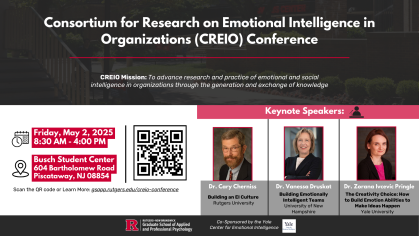Consortium for Research on Emotional Intelligence in Organizations (CREIO) Conference

CREIO Mission: To advance research and practice of emotional and social intelligence in organizations through the generation and exchange of knowledge.
Co-Sponsored by Yale Center for Emotional Intelligence
Keynote Speakers:
Building an EI Culture | Dr. Cary Cherniss, Rutgers University
Over 40 published evaluation studies of EI training programs for adults have shown that emotional intelligence can be increased. However, many participants will not use their EI if the culture of their organizations does not support it. In the course of writing our new book (Optimal: How to Sustain Personal and Organizational Excellence Every Day), we identified several organizations that have created "EI-friendly" cultures. In this talk, I will describe how they did it.
Building Emotionally Intelligent Teams | Dr. Vanessa Druskat, University of New Hampshire
During her presentation, Vanessa will discuss some of the key insights from her upcoming book, The Emotionally Intelligent Team: Building Collaborative Groups that Outperform the Rest. Vanessa will draw on thirty years of research on teams to present a model for building and leading emotionally intelligent teams and will cover topics and provide practical advice on how to:
• Create a solid team foundation that meets a team's basic structural needs
• Work with a team to build nine norms that develop an emotionally intelligent team culture
• Support team-member sense of belonging
• Increase team trust, psychological safety, and team identity
The Creativity Choice: How to Build Emotion Abilities to Make Ideas Happen | Dr. Zorana Ivcevic Pringle, Yale University
When we see something creative, whether it is an awe-inspiring piece of art, a major scientific discovery, an innovative consumer product, or anything else, we tend to ask how the creators thought of it. Where did the ideas come from? The surprising thing about creativity is that coming up with ideas is not the most challenging part. Rather, the process of doing something with those ideas and developing them from abstractions in our heads to something tangible is the real challenge. Making ideas happen starts with a choice. We have to choose to act, usually despite obstacles until ideas take shape. I will first ask what shapes that initial decision. As with many decisions, this one is influenced by our emotions (e.g., from anxiety-provoking uncertainty to our level of confidence) and how we are able to cope with them.
Even if we make the decision to act, we still need to know how to move from deciding to get started to actually doing and persisting. During this presentation, I will guide the audience through a set of insights and tools that can help along the way. Because the greatest challenges of creative work pertain to managing the emotional ups and downs – from reputational and intellectual risks to frustrating obstacles and creative blocks – emotion abilities are key to long-term persistence and success. And finally, I want to acknowledge that creativity is social even when it does not seem to be. Both our ideas and actions are influenced by others around us and the emotional climate in our social environment. There is no roadmap with a set of turn-by-turn instructions for successful creativity. But knowing the lay of the land provided by the science of creativity can allow creators to blaze their own trails.
